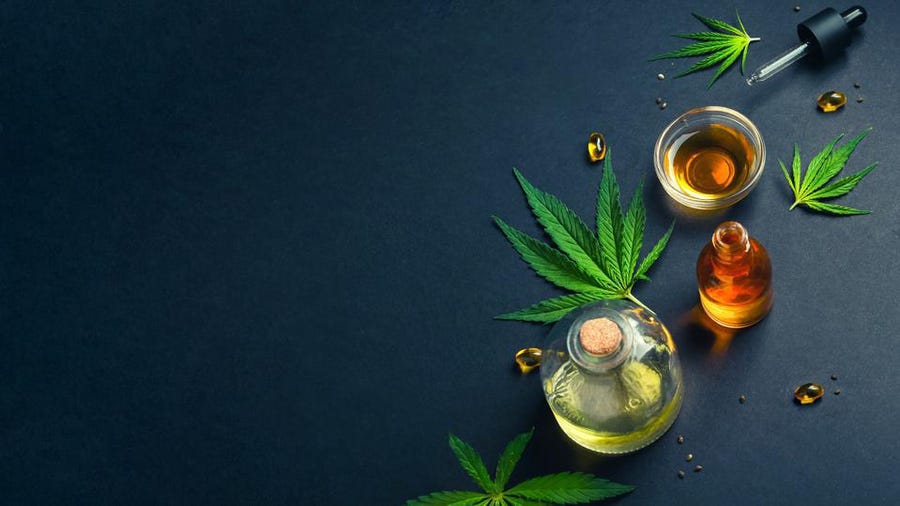
Science backed Benefits of CBD
Share
Cannabidiol, or CBD, is a chemical compound found in the cannabis sativa plant. When applied topically or consumed through smoke inhalation or edible consumption, CBD interacts with neuroreceptors in your endocannabinoid system, which sends signals between your cells to help regulate your movement, mood, homeostasis and immune system.
In recent years, CBD oil has skyrocketed in popularity thanks to its purported calming effects. It can now be found in a range of products from simple oil tinctures to CBD-infused potato chips.
CBD research is growing, too. Here are nine ways studies suggest CBD oil could benefit your health.1. Offset Anxiety and Depression
CBD’s ability to calm is perhaps its most popular effect and the reason its use is so widespread. A 2017 study in the Brazilian Journal of Psychiatry tested the anxiety levels of 57 men in a simulated public speaking test. Some received a placebo while others received either 150 milligrams, 300 milligrams or 600 milligrams of CBD before their speeches. Those who received 300 milligrams of CBD experienced significantly reduced anxiety during the test compared to those who received the placebo.
2. Treat Select Epilepsy Syndromes
In some instances, CBD can be used to treat epileptic seizures.
In 2018, the Food and Drug Administration (FDA) approved the use of CBD under the brand name Epidiolex to treat seizures resulting from Lennox-Gastaut syndrome and Dravet syndrome—two rare forms of epilepsy—in patients at least 2 years old.
3. Reduce PTSD Symptoms
In a small 2018 study in the Journal of Alternative and Complementary Medicine, 11 people with post-traumatic stress disorder (PTSD) received CBD along with routine psychiatric care for eight weeks in an outpatient psychiatric clinic. Ten of the 11 experienced a decrease in their PTSD symptoms. CBD was generally well tolerated, the researchers write.
Margaret Rajnic, a doctor of nursing practice experienced in medical cannabis and CBD, emphasizes the importance of using therapy in tandem with any type of cannabis or CBD for PTSD. “There is an amount of therapy that is needed for PTSD,” she says. “But CBD will give you that little bit of decreased anxiety.”
4. Treat Opioid Addiction
Some studies—both preclinical animal and human clinical trials—suggest CBD could be used to help treat people who are dependent on opioids.
In one such study, researchers administered CBD to people with heroin use disorder. Over the course of a week, CBD significantly reduced heroin users’ cue-induced cravings, withdrawal anxiety, resting heart rate and salivary cortisol levels. No serious adverse effects were found.
5. Alleviate ALS Symptoms
Amyotrophic lateral sclerosis (ALS) is a disease that causes nerve cells in the brain and spinal cord to deteriorate, resulting in loss of muscle control that worsens over time. It’s not yet understood exactly why ALS occurs, although it can be hereditary in some cases. There’s no known cure, and there are only two FDA-approved medications to help treat ALS symptoms.
Research suggests people with ALS can benefit from the entourage effect created by the combination of THC and CBD, similar to people with PTSD. In a 2019 study, patients received a combination of THC and CBD in varying doses depending on their needs and preferences. Those with mild, moderate or severe spasticity (muscle tightness and stiffness) due to ALS reported high levels of satisfaction with the treatment, and those with moderate to severe spasticity reported higher satisfaction rates than those with mild spasticity.
6. Relieve Unmanageable Pain
In 2005, Canada approved the use of Sativex, an oromucosal (absorbed in the lining of the mouth) spray with equal proportions of THC and CBD, for the treatment of multiple sclerosis-related central neuropathic pain. In 2007, Canada approved the medicine’s use again for cancer pain that proved unresponsive to other medications.
Meanwhile, continued studies in the U.S. indicate CBD is effective in treating chronic, non-cancer pain. In one 2020 study, researchers administered CBD topically to a group of patients with symptomatic peripheral neuropathy (a result of brain nerve and spinal cord nerve damage) while another group with the same condition received a placebo. Results showed a significant reduction in intense, sharp pains and cold, itchy sensations in those who used the topical CBD compared to those who used the placebo. No participants reported adverse side effects.
When introduced topically, CBD oil doesn’t affect the systemic issue as it might if it were introduced directly into the bloodstream. Instead, topical CBD is more localized and treats pain in a certain area. Since it’s more direct, it may have a more pronounced effect.
7. Ease Diabetic Complications
For starters, tests on human cells found that CBD helps reduce the effects of high glucose levels on other cells in the body, which typically precedes the development of diabetes and various complications. Researchers concluded that with further studies, CBD could have significant benefits when used in patients with diabetes, diabetic complications and plaque buildup in artery walls.
In another small study, 13 patients with type 2 diabetes who weren’t on insulin treatment were given both CBD and a placebo (in lieu of insulin). Researchers found CBD decreased their levels of resistin (which causes resistance to insulin, the protein that regulates sugar levels) and increased their levels of glucose-dependent insulinotropic peptide (a hormone that ensures a sufficient release of insulin from digested food) compared to their baselines before they started the test. These results suggest CBD could be a natural treatment for diabetes by helping the body regulate insulin-related hormone levels.
8. Protect Against Neurological Disease
Preclinical and clinical studies show that CBD has antioxidant and anti-inflammatory properties. Researchers deduce these characteristics can provide significant neuroprotection, or protection against numerous pathological disorders.
9. Inhibit Arthritis Symptoms
Arthritis involves the deterioration of the tissues in and around your joints. There are several types of arthritis, and symptoms include pain, stiffness and loss of motion. Arthritis treatment usually targets pain relief and improved joint function.
Article was taken from Forbes, see link below
Source : http://www.forbes.com/health/body/cbd-oil-benefits/